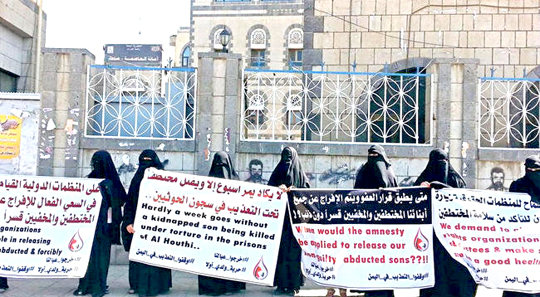Washington/Jeddah, May 14: Saudi Arabia’s permanent representative at the UN, Abdullah Al-Mouallimi, said the human aspect in the Yemen war is most important for the Arab coalition waging military operations to restore government legitimacy there, contradicting propaganda circulated by the Houthi militias.

Speaking at a symposium at the Arab Gulf Countries Institute in Washington, Al-Mouallimi refuted as “fairy tales” Houthi allegations against the coalition about the war in Yemen.
He rejected the Houthi stance that the war erupted in March 2015, while in reality it started in September 2014.
He also described as false that the Houthis represent a large percentage of the Yemeni population, but instead represent only 2 to 3 percent.
Al-Mouallimi said that the coalition has not laid a sea siege on the country, barring food supplies from reaching Yemenis as claimed by the militias. He noted that food shortages exist in areas under Houthi control and relief sent to these areas does not find its way to the needy.
Al-Mouallimi also denied Houthi allegations that the coalition is not concerned about the damage done to the Yemeni infrastructure and key facilities. He said Saudi Arabia and other GCC countries have pledged more than $4 billion of continued aid to Yemenis, in addition to allocating $10 billion for Yemen’s reconstruction.
Al-Mouallimi said the Houthis will be defeated and the Yemeni people will restore their destiny under an internationally recognized leadership, a government elected with the help of Saudi Arabia, GCC countries and members in the coalition.
Hamdan Al-Shehri, a political analyst and international relations expert, told Arab News Saturday that the Houthi militias are cooperating with Iran, which is playing a dirty game by utilizing its media to spread Houthi lies to present them to the world as the underdog.
He said: “The international community should not be fooled by the Houthi and Iranian propaganda. The facts on the ground speak for themselves. The Yemeni citizens in the Houthi-controlled areas are suffering and are being oppressed and deprived of their basic needs, while the Houthi militias continue to confiscate the humanitarian aid and distribute it among themselves or sell them to the citizens to cover the expenses.”
A report by Yemen’s National Human Rights Commission issued in March pointed to crimes against unarmed civilians including indiscriminate shelling of residential compounds and popular markets, using artillery and Katyusha rocket launchers.
The report described grave violations of international human rights law and crimes against humanity, saying the perpetrators must be punished.
It cited 11 incidents in which Houthis and forces loyal to deposed President Abdullah Saleh carried out massacres, including the targeting and killing of displaced people from Tawahi, with militias dropping mortars on unarmed civilians fleeing in small boats.
According to the report, human rights teams recorded the killing of nearly 11,000 Yemeni civilians, including 679 women, 1,002 children and 9,160 men, over the past two years by Houthi gunfire and shelling.
The majority of victims were killed in 2015, the report said, confirming that Houthi and Saleh militias had been deliberately targeting civilians.
Previously, Abdul Raqeeb Fatah, the Yemeni minister of local administration and president of the Supreme Committee of Relief, accused the Houthis and Saleh’s militias of willfully starving the Yemeni people by detaining the 34 ships carrying relief, humanitarian and medical aid provided by GCC countries. He said that Houthi militias prevented ships from entering seaports of Hodeidah and Saleef.
In a statement to the Yemeni Press Agency, he said the Yemeni people have been deprived of 496,000 tons of foodstuff, 146,000 tons of oil and 275,000 tons of iron and cement.
“Despite repetitive calls to drop weapons and resort to the negotiations table with the legitimate government, this (Houthi) militia refuses to engage in a political process based on the UN Resolution 2216 and the GCC initiative and the outcomes of the Yemeni national dialogue. The international community and the United Nations have not been up to their duties either by implementing the relevant resolutions or by pressuring the militias to abide by the relevant international legitimacy and the will of the Yemeni people,” said Al-Shehri.
He added that the previous US administration opted to stay out of the Yemen conflict, unlike the Trump administration, which is willing to be more active to end the Iranian intervention in the region and put an end to the Iranian expansionist designs.
Maj. Gen. Yahya Asiri of the Saudi Defense Ministry said that the humanitarian aspect is the most important objective and that the coalition forces take maximum care to protect civilians. They keep updated lists of places, people and things that must not be targeted, he added.
Asiri said the Houthis continuously disrupt relief and humanitarian efforts and attack the Saudi border, but the Armed Forces in most cases deter the attacks through pre-emptive operations.
He said Houthis have launched as many as 49 missiles into Saudi territories and planted dozens of mines along the Kingdom’s southern border, in addition to many sea mines.
He added that the Arab Coalition respects all pertinent UN decisions on the issue, including Resolution 2216, and the truce agreements, while the Houthis constantly fail to live up to binding commitments, and have committed as many as 4,500 violations of the cease-fire agreements.






Comments
Add new comment